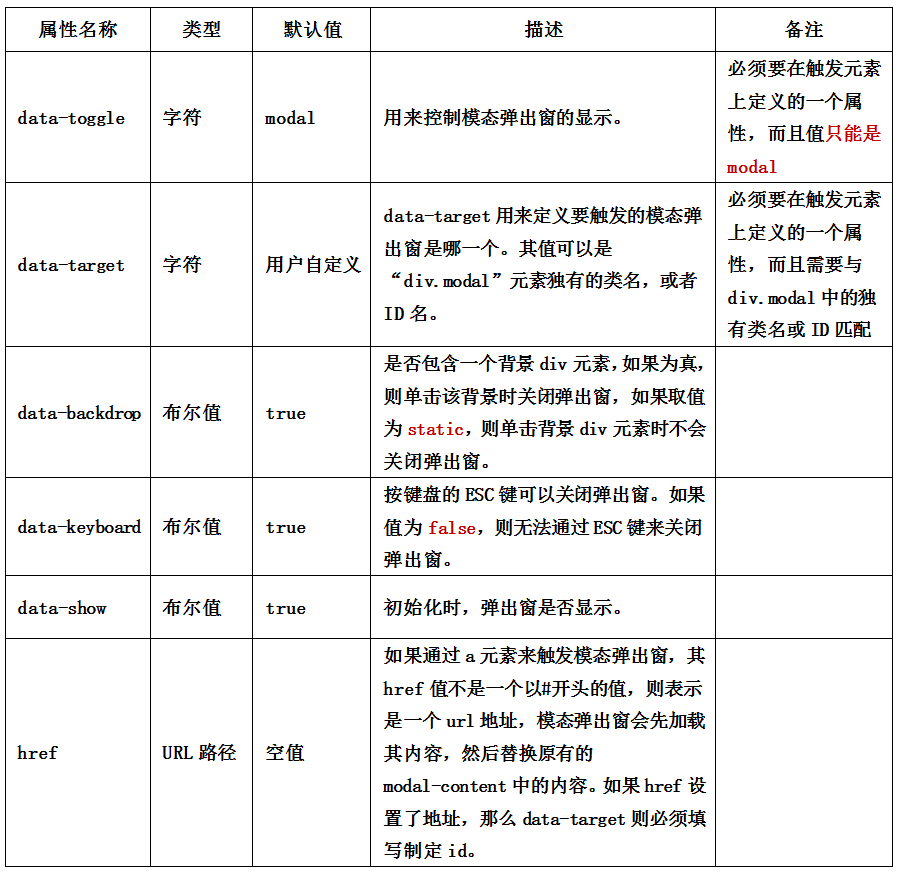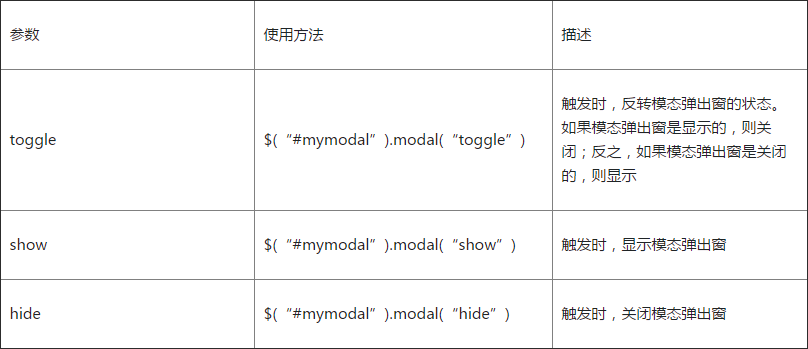前面的话
在 Bootstrap 框架中把模态弹出框统一称为 Modal。这种弹出框效果在大多数 Web 网站的交互中都可见。比如点击一个按钮弹出一个框,弹出的框可能是一段文件描述,也可能带有按钮操作,也有可能弹出的是一张图片。本文将详细介绍Bootstrap模态弹出框
结构分析
Bootstrap框架中的模态弹出框,分别运用了“modal”、“modal-dialog”和“modal-content”样式,而弹出窗真正的内容都放置在“modal-content”中,其主要又包括三个部分:
☑ 弹出框头部,一般使用“modal-header”表示,主要包括标题和关闭按钮
☑ 弹出框主体,一般使用“modal-body”表示,弹出框的主要内容
☑ 弹出框脚部,一般使用“modal-footer”表示,主要放置操作按钮
<div class="modal show"> <div class="modal-dialog"> <div class="modal-content"> <div class="modal-header"> <button type="button" class="close" data-dismiss="modal"><span aria-hidden="true">×</span><span class="sr-only">Close</span></button> <h4 class="modal-title">模态弹出窗标题</h4> </div> <div class="modal-body"> <p>模态弹出窗主体内容</p> </div> <div class="modal-footer"> <button type="button" class="btn btn-default" data-dismiss="modal">关闭</button> <button type="button" class="btn btn-primary">保存</button> </div> </div><!-- /.modal-content --> </div><!-- /.modal-dialog --> </div><!-- /.modal -->
对于弹窗而言,modal-content是样式的关键。主要设置了弹窗的边框、边距、背景色和阴影等样式
.modal-content { position: relative; background-color: #fff; -webkit-background-clip: padding-box; background-clip: padding-box; border: 1px solid #999; border: 1px solid rgba(0, 0, 0, .2); border-radius: 6px; outline: 0; -webkit-box-shadow: 0 3px 9px rgba(0, 0, 0, .5); box-shadow: 0 3px 9px rgba(0, 0, 0, .5); }
除此之外,modal-content中的modal-header、modal-body和modal-footer三个部分样式设置如下
.modal-header { min-height: 16.42857143px; padding: 15px; border-bottom: 1px solid #e5e5e5; } .modal-header .close { margin-top: -2px; } .modal-title { margin: 0; line-height: 1.42857143; } .modal-body { position: relative; padding: 15px; } .modal-footer { padding: 15px; text-align: right; border-top: 1px solid #e5e5e5; }
这三个部分主要控制一些间距的样式。而modal-footer都是用来放置按钮,所以底部还对包含的按钮做了一定的样式处理
.modal-footer .btn + .btn { margin-bottom: 0; margin-left: 5px; } .modal-footer .btn-group .btn + .btn { margin-left: -1px; } .modal-footer .btn-block + .btn-block { margin-left: 0; }
触发方式
众所周知,模态弹出窗在页面加载完成时,是被隐藏在页面中的,只有通过一定的动作(事件)才能触发模态弹出窗的显示。在Bootstrap框架中实现方法有2种
在介绍触发方式之前,首先要说明.show和.fade这两个方法。只有模态弹出窗默认是隐藏的,才能触发其显示
.fade { opacity: 0; -webkit-transition: opacity .15s linear; -o-transition: opacity .15s linear; transition: opacity .15s linear; } .show { display: block!important; }
【方法一】
模态弹出窗声明,只需要自定义两个必要的属性:data-toggle和data-target(bootstrap中声明式触发方法一般依赖于这些自定义的data-xxx 属性。比如data-toggle="" 或者 data-dismiss="")
data-toggle必须设置为modal(toggle中文翻译过来就是触发器);
data-target可以设置为CSS的选择符,也可以设置为模态弹出窗的ID值,一般情况设置为模态弹出窗的ID值,因为ID值是唯一的值
<!-- 触发模态弹出窗的元素 --> <button type="button" data-toggle="modal" data-target="#mymodal" class="btn btn-primary">点击</button> <!-- 模态弹出窗 --> <div class="modal fade" id="mymodal"> <div class="modal-dialog"> <div class="modal-content"> <div class="modal-header"> <button type="button" class="close" data-dismiss="modal"><span aria-hidden="true">×</span><span class="sr-only">Close</span></button> <h4 class="modal-title">模态弹出窗标题</h4> </div> <div class="modal-body"> <p>模态弹出窗主体内容</p> </div> <div class="modal-footer"> <button type="button" class="btn btn-default" data-dismiss="modal">关闭</button> <button type="button" class="btn btn-primary">保存</button> </div> </div><!-- /.modal-content --> </div><!-- /.modal-dialog --> </div><!-- /.modal -->
【方法二】
触发模态弹出窗也可以是一个链接<a>元素,那么可以使用链接元素自带的href属性替代data-target属性
不过建议还是使用统一使用data-target的方式来触发
<!-- 触发模态弹出窗的元素 --> <a data-toggle="modal" href="#mymodal" class=" btn btn-primary" >点击</a> <!-- 模态弹出窗 --> <div class="modal fade" id="mymodal"> <div class="modal-dialog"> <div class="modal-content"> <div class="modal-header"> <button type="button" class="close" data-dismiss="modal"><span aria-hidden="true">×</span><span class="sr-only">Close</span></button> <h4 class="modal-title">模态弹出窗标题</h4> </div> <div class="modal-body"> <p>模态弹出窗主体内容</p> </div> <div class="modal-footer"> <button type="button" class="btn btn-default" data-dismiss="modal">关闭</button> <button type="button" class="btn btn-primary">保存</button> </div> </div><!-- /.modal-content --> </div><!-- /.modal-dialog --> </div><!-- /.modal -->
尺寸
Bootstrap框架为模态弹出窗提供了不同尺寸,一个是大尺寸样式“modal-lg”,另一个是小尺寸样式“modal-sm”。其结构上稍做调整
[注意].bs-example-modal-lg和.bs-example-modal-sm是自定义的名称,而非必须
<!-- 大尺寸模态弹出窗 --> <div class="modal fade bs-example-modal-lg" tabindex="-1" role="dialog" aria-labelledby="myLargeModalLabel" aria-hidden="true"> <div class="modal-dialog modal-lg"> <div class="modal-content"> ... </div> </div> </div> <!-- 小尺寸模态弹出窗 --> <div class="modal fade bs-example-modal-sm" tabindex="-1" role="dialog" aria-labelledby="mySmallModalLabel" aria-hidden="true"> <div class="modal-dialog modal-sm"> <div class="modal-content"> ... </div> </div> </div>
<button type="button" class="btn btn-primary" data-toggle="modal" data-target=".bs-example-modal-lg">大尺寸</button> <button type="button" class="btn btn-primary" data-toggle="modal" data-target="#myModal">默认尺寸</button> <button type="button" class="btn btn-primary" data-toggle="modal" data-target=".bs-example-modal-sm">小尺寸</button> <div class="modal fade" id="myModal"> <div class="modal-dialog"> <div class="modal-content"> <div class="modal-body"> <p>小火柴的蓝色理想</p> </div> </div> </div> </div> <div class="modal fade bs-example-modal-lg"> <div class="modal-dialog modal-lg"> <div class="modal-content"> <div class="modal-body"> <p>小火柴的蓝色理想</p> </div> </div> </div> </div> <div class="modal fade bs-example-modal-sm"> <div class="modal-dialog modal-sm"> <div class="modal-content"> <div class="modal-body"> <p>小火柴的蓝色理想</p> </div> </div> </div> </div>
CSS解析
bootstrap中的“模态弹出框”有以下几个特点:
1、模态弹出窗是固定在浏览器中的。
2、单击右侧全屏按钮,在全屏状态下,模态弹出窗宽度是自适应的,而且modal-dialog水平居中。
3、当浏览器视窗大于768px时,模态弹出窗的宽度为600px
4、模态弹出窗的背景常常有一个透明的蒙层效果
5、触发弹窗时,弹窗是从上到下、逐渐浮现到页面前的
【固定在浏览器实现】
.modal { position: fixed; top: 0; right: 0; bottom: 0; left: 0; z-index: 1050; display: none; overflow: hidden; -webkit-overflow-scrolling: touch; outline: 0; }
【水平居中实现】
.modal-dialog { position: relative; width: auto; margin: 10px; }
【当浏览器视窗大于768px时,模态弹出窗的宽度为600px实现】
@media (min- 768px) { .modal-dialog { width: 600px; margin: 30px auto; } .modal-content { -webkit-box-shadow: 0 5px 15px rgba(0, 0, 0, .5); box-shadow: 0 5px 15px rgba(0, 0, 0, .5); } .modal-sm { width: 300px; } }
【蒙版】
弹窗弹出时为 <body> 元素添加 .modal-open类,从而覆盖页面默认的滚动行为,并且还会自动生成一个 .modal-backdrop 元素用于提供一个可点击的区域,点击此区域就即可关闭模态框
.modal-open { overflow: hidden; }
.modal-backdrop { position: fixed; top: 0; right: 0; bottom: 0; left: 0; z-index: 1040; background-color: #000; }
给其添加了一个过渡动画,从fade到in,把opacity值从0变成了0.5
.modal-backdrop.fade { filter: alpha(opacity=0); opacity: 0; } .modal-backdrop.in { filter: alpha(opacity=50); opacity: .5; }
【动画效果】
弹窗的动画内容是从-25%的top值位置到top:0的位置
.modal.fade .modal-dialog { -webkit-transition: -webkit-transform .3s ease-out; -o-transition: -o-transform .3s ease-out; transition: transform .3s ease-out; -webkit-transform: translate3d(0, -25%, 0); -o-transform: translate3d(0, -25%, 0); transform: translate3d(0, -25%, 0); } .modal.in .modal-dialog { -webkit-transform: translate3d(0, 0, 0); -o-transform: translate3d(0, 0, 0); transform: translate3d(0, 0, 0); }
如果不需要模态框弹出时的动画效果(淡入淡出效果),删掉 .fade 类即可
<!-- 触发模态弹出窗的元素 --> <button type="button" data-toggle="modal" data-target="#mymodal" class="btn btn-primary">点击</button> <!-- 模态弹出窗 --> <div class="modal" id="mymodal"> <div class="modal-dialog"> <div class="modal-content"> <div class="modal-header"> <button type="button" class="close" data-dismiss="modal"><span aria-hidden="true">×</span><span class="sr-only">Close</span></button> <h4 class="modal-title">模态弹出窗标题</h4> </div> <div class="modal-body"> <p>模态弹出窗主体内容</p> </div> <div class="modal-footer"> <button type="button" class="btn btn-default" data-dismiss="modal">关闭</button> <button type="button" class="btn btn-primary">保存</button> </div> </div><!-- /.modal-content --> </div><!-- /.modal-dialog --> </div><!-- /.modal -->
参数说明
除了通过data-toggle和data-target来控制模态弹出窗之外,Bootstrap框架针对模态弹出框还提供了其他自定义data-属性,来控制模态弹出窗。有关Modal弹出窗自定义属性相关说明如下所示
该参数设置在按钮上,或者弹窗上都可以。出于方便,一般地,在按钮上设置
[注意]属性值一定要加引号,如data-backdrop="false"
如果想要支持esc键关闭弹窗,需要在弹窗上设置tabindex="-1"

<button type="button" data-toggle="modal" data-target="#mymodal1" class="btn btn-primary">默认样式</button> <button type="button" data-toggle="modal" data-target="#mymodal2" data-backdrop="false" class="btn btn-primary">无蒙版</button> <button type="button" data-toggle="modal" data-target="#mymodal3" data-keyboard="false" class="btn btn-primary">ESC失效</button> <button type="button" data-toggle="modal" data-target="#mymodal4" data-show="false" class="btn btn-primary">弹窗默认不显示</button> <div class="modal fade" tabindex="-1" id="mymodal1"> <div class="modal-dialog"> <div class="modal-content"> <div class="modal-header"> <button type="button" class="close" data-dismiss="modal"><span aria-hidden="true">×</span><span class="sr-only">Close</span></button> <h4 class="modal-title">小火柴的蓝色理想</h4> </div> <div class="modal-body"> <p>好的代码像粥一样,都是用时间熬出来的</p> </div> </div> </div> </div> <div class="modal fade" tabindex="-1" id="mymodal2"> <div class="modal-dialog"> <div class="modal-content"> <div class="modal-header"> <button type="button" class="close" data-dismiss="modal"><span aria-hidden="true">×</span><span class="sr-only">Close</span></button> <h4 class="modal-title">小火柴的蓝色理想</h4> </div> <div class="modal-body"> <p>好的代码像粥一样,都是用时间熬出来的</p> </div> </div> </div> </div> <div class="modal fade" tabindex="-1" id="mymodal3"> <div class="modal-dialog"> <div class="modal-content"> <div class="modal-header"> <button type="button" class="close" data-dismiss="modal"><span aria-hidden="true">×</span><span class="sr-only">Close</span></button> <h4 class="modal-title">小火柴的蓝色理想</h4> </div> <div class="modal-body"> <p>好的代码像粥一样,都是用时间熬出来的</p> </div> </div> </div> </div> <div class="modal fade" tabindex="-1" id="mymodal4"> <div class="modal-dialog"> <div class="modal-content"> <div class="modal-header"> <button type="button" class="close" data-dismiss="modal"><span aria-hidden="true">×</span><span class="sr-only">Close</span></button> <h4 class="modal-title">小火柴的蓝色理想</h4> </div> <div class="modal-body"> <p>好的代码像粥一样,都是用时间熬出来的</p> </div> </div> </div> </div>
JS触发
除了使用自定义属性data-触发模态弹出框之外,还可以通过JavaScript方法来触发模态弹出窗。比如说给按钮设置一个单击事件,然后触发模态弹出窗
只需一行 JavaScript 代码,即可通过元素的 id myModal 调用模态框
$('#myModal').modal()
<button type="button" class="btn btn-primary">点击</button> <div class="modal fade" tabindex="-1" id="mymodal"> <div class="modal-dialog"> <div class="modal-content"> <div class="modal-header"> <button type="button" class="close" data-dismiss="modal"><span aria-hidden="true">×</span><span class="sr-only">Close</span></button> <h4 class="modal-title">小火柴的蓝色理想</h4> </div> <div class="modal-body"> <p>好的代码像粥一样,都是用时间熬出来的</p> </div> </div> </div> </div> <script> $(function(){ $(".btn").click(function(){ $("#mymodal").modal(); }); }); </script>
使用JavaScript触发模态弹出窗时,Bootstrap框架提供了一些设置,主要包括属性设置、参数设置和事件设置
【属性设置】
模态弹出窗默认支持的自定义属性主要有

不想让用户按ESC键关闭模态弹出窗,可以这样做
$(function(){ $(".btn").click(function(){ $("#mymodal").modal({ keyboard:false }); }); });
【参数设置】
在Bootstrap框架中还为模态弹出窗提供了三种参数设置,具体说明如下

<button type="button" class="btn btn-primary" id="btn" style="position:absolute;z-index:9999">打开(关闭)</button>
<div class="modal" tabindex="-1" id="mymodal" >
<div class="modal-dialog">
<div class="modal-content">
<div class="modal-header">
<button type="button" class="close" data-dismiss="modal"><span aria-hidden="true">×</span><span class="sr-only">Close</span></button>
<h4 class="modal-title">小火柴的蓝色理想</h4>
</div>
<div class="modal-body">
<p>好的代码像粥一样,都是用时间熬出来的</p>
</div>
</div>
</div>
</div>
<script>
;$(function(){
$("#btn").click(function(){
$("#mymodal").modal("toggle");
});
});
</script>
【事件设置】
模态弹窗还支持五种类型的事件,分别是模态弹出窗的弹出前、弹出后,关闭前、关闭后及远端数据加载后,具体描述如下:

<button type="button" class="btn btn-primary" id="btn" style="position:absolute;z-index:9999">打开</button> <div class="modal" tabindex="-1" id="mymodal" > <div class="modal-dialog"> <div class="modal-content"> <div class="modal-header"> <button type="button" class="close" data-dismiss="modal"><span aria-hidden="true">×</span><span class="sr-only">Close</span></button> <h4 class="modal-title">小火柴的蓝色理想</h4> </div> <div class="modal-body"> <p>好的代码像粥一样,都是用时间熬出来的</p> </div> </div> </div> </div> <script> ;$(function(){ $("#btn").click(function(){ $("#mymodal").modal("toggle"); }); $('#mymodal').on('hide.bs.modal', function(){ $("#btn").html("打开"); }); $('#mymodal').on('show.bs.modal', function(){ $("#btn").html("关闭"); }); }); </script>
JS解析
【1】IIFE
使用立即调用函数,防止插件内代码外泄,从而形成一个闭环,并且只能从jQuery的fn里进行扩展
+function ($) { //使用es5严格模式 'use strict'; // }(window.jQuery);
【2】初始设置
var Modal = function (element, options) { this.options = options//options是设置选项 this.$body = $(document.body)//body元素 this.$element = $(element)////element表示modal弹出框容器及内容元素 this.$dialog = this.$element.find('.modal-dialog')//弹窗对象 this.$backdrop = null //蒙版对象 this.isShown = null //弹窗是否显示的标识 this.originalBodyPad = null //body的padding-right标识 this.scrollbarWidth = 0 //滚动条宽度为0 this.ignoreBackdropClick = false //默认蒙板可点击 //如果设置了remote,就加载remote指定url的内容到modal-content样式的元素内,并触发loaded.bs.modal事件 if (this.options.remote) { this.$element .find('.modal-content') .load(this.options.remote, $.proxy(function () { this.$element.trigger('loaded.bs.modal') }, this)) } } //组件版本号3.3.7 Modal.VERSION = '3.3.7' //动画持续时间300ms Modal.TRANSITION_DURATION = 300 //蒙版动画持续时间150ms Modal.BACKDROP_TRANSITION_DURATION = 150 //默认设置 Modal.DEFAULTS = { backdrop: true, //显示蒙版 keyboard: true, //按ESC键关闭弹窗 show: true //单击触发元素时打开弹窗 }
【3】插件核心代码
主要是Modal核心类函数的定义、默认参数的定义和9个原型方法的定义,这9个原型方法主要是处理弹窗的反转、打开、关闭和弹窗背景设置、取消等操作
// 反转弹窗(打开或关闭) Modal.prototype.toggle = function (_relatedTarget) { //如果弹窗处于显示状态,则调用hide()方法,关闭它;否则,调用show()方法,打开弹窗 return this.isShown ? this.hide() : this.show(_relatedTarget) } // 打开弹窗 Modal.prototype.show = function (_relatedTarget) { //保存this值 var that = this //定义弹窗前的触发事件 var e = $.Event('show.bs.modal', { relatedTarget: _relatedTarget }) //打开弹窗前,触发事件 this.$element.trigger(e) // 如果已经打开了(或者曾经被阻止过),则退出执行,后续代码不做处理 if (this.isShown || e.isDefaultPrevented()) return //设置弹窗显示标识为true this.isShown = true this.checkScrollbar() this.setScrollbar() this.$body.addClass('modal-open') //处理键盘事件,主要是设置按esc键时是否关闭弹窗 this.escape() this.resize() // 如果单击了元素内的子元素(带有[data-dismiss="modal"]属性),则关闭弹窗 this.$element.on('click.dismiss.bs.modal', '[data-dismiss="modal"]', $.proxy(this.hide, this)) //点击弹窗时,如果鼠标的目标是当前弹窗,则将默认蒙板不可点击的标识置为true,并不可再设置 this.$dialog.on('mousedown.dismiss.bs.modal', function () { that.$element.one('mouseup.dismiss.bs.modal', function (e) { if ($(e.target).is(that.$element)) that.ignoreBackdropClick = true }) }) //绘制蒙版后,处理以下代码 this.backdrop(function () { // 判断浏览器是否支持动画,并且弹窗是否设置了动画过渡效果(是否有fade样式) var transition = $.support.transition && that.$element.hasClass('fade') // 如果modal弹窗没有父容器,则将它附加到body上 if (!that.$element.parent().length) { that.$element.appendTo(that.$body) } // 显示modal弹窗 that.$element .show() .scrollTop(0) that.adjustDialog() // 如果支持动画,强制刷新UI现场,重绘弹窗 if (transition) { that.$element[0].offsetWidth } // 给modal弹窗添加in样式,和modal样式一起 that.$element.addClass('in') // 强制给弹窗设定焦点 that.enforceFocus() // 打开弹窗显示后的触发事件 var e = $.Event('shown.bs.modal', { relatedTarget: _relatedTarget }) transition ? that.$dialog //找到弹窗元素 .one('bsTransitionEnd', function () { // 如果支持动画,则动画结束以后给弹窗内的元素设置焦点,并触发shown事件 that.$element.trigger('focus').trigger(e) }) .emulateTransitionEnd(Modal.TRANSITION_DURATION) : // 否则直接设置焦点,并触发shown事件 that.$element.trigger('focus').trigger(e) }) } // 关闭弹窗 Modal.prototype.hide = function (e) { //阻止冒泡 if (e) e.preventDefault() //定义关闭弹窗前的触发事件 e = $.Event('hide.bs.modal') //关闭弹窗前触发事件 this.$element.trigger(e) // 如果已经关闭了(或者曾经被阻止过),则退出执行,后续代码不做处理 if (!this.isShown || e.isDefaultPrevented()) return //设置显示状态标识为false this.isShown = false //处理键盘事件,主要是设置按Esc键的时候是否关闭弹窗 this.escape() this.resize() //取消所有的focusin.bs.modal事件 $(document).off('focusin.bs.modal') this.$element .removeClass('in') //删除in样式 .off('click.dismiss.bs.modal') //取消dismiss的单击事件 .off('mouseup.dismiss.bs.modal')//取消dismiss的鼠标抬起事件 //取消dismiss的鼠标放下事件 this.$dialog.off('mousedown.dismiss.bs.modal') //如果支持动画,则动画结束以后再关闭,否则直接关闭 $.support.transition && this.$element.hasClass('fade') ? this.$element .one('bsTransitionEnd', $.proxy(this.hideModal, this)) .emulateTransitionEnd(Modal.TRANSITION_DURATION) : this.hideModal() } //强制弹窗处于焦点状态 Modal.prototype.enforceFocus = function () { $(document) // 禁用所有的focusin事件,防止无限循环 .off('focusin.bs.modal') .on('focusin.bs.modal', $.proxy(function (e) { if (this.$element[0] !== e.target && !this.$element.has(e.target).length) { // 如果处于焦点的元素不是当前元素(或不包含当前元素),则强制给当前元素设置焦点 this.$element.trigger('focus') } }, this)) } //按Esc键是否退出的处理 Modal.prototype.escape = function () { if (this.isShown && this.options.keyboard) { //如果弹窗是打开状态,并且keyboard选项为true,则说明允许按ESC键可以关闭弹窗 this.$element.on('keydown.dismiss.bs.modal', $.proxy(function (e) { //检测键盘事件,如果是ESC(keycode=27),则关闭 e.which == 27 && this.hide() }, this)) } else if (!this.isShown) { // 否则,取消键盘事件检测 this.$element.off('keydown.dismiss.bs.modal') } } Modal.prototype.resize = function () { if (this.isShown) { $(window).on('resize.bs.modal', $.proxy(this.handleUpdate, this)) } else { $(window).off('resize.bs.modal') } } //关闭弹窗 Modal.prototype.hideModal = function () { var that = this //关闭弹窗 this.$element.hide() this.backdrop(function () { //移除body上的modal-open样式 that.$body.removeClass('modal-open') that.resetAdjustments() that.resetScrollbar() //关闭以后,触发hidden事件 that.$element.trigger('hidden.bs.modal') }) } //删除蒙版,关闭弹窗时触发 Modal.prototype.removeBackdrop = function () { // 删除蒙版 this.$backdrop && this.$backdrop.remove() // 设置蒙版对象为null this.$backdrop = null } //添加蒙版,打开弹窗时触发 Modal.prototype.backdrop = function (callback) { var that = this //是否设置了动画过渡效果,如果是则将animate设置为fade var animate = this.$element.hasClass('fade') ? 'fade' : '' //如果是打开状态,并且设置了backdrop参数 if (this.isShown && this.options.backdrop) { //定义动画标识 var doAnimate = $.support.transition && animate // 在body上定义蒙版div元素,并附加fade标识以支持动画 this.$backdrop = $(document.createElement('div')) .addClass('modal-backdrop ' + animate) .appendTo(this.$body) //蒙版被单击时进行判断:如果backdrop参数为static,则强制将弹窗设置为售点;否则,关闭弹窗 this.$element.on('click.dismiss.bs.modal', $.proxy(function (e) { if (this.ignoreBackdropClick) { this.ignoreBackdropClick = false return } if (e.target !== e.currentTarget) return this.options.backdrop == 'static' ? this.$element[0].focus() : this.hide() }, this)) // 如果支持动画,强制刷新UI现场,重绘弹窗 if (doAnimate) this.$backdrop[0].offsetWidth //添加in样式 this.$backdrop.addClass('in') //如果没有回调,则直接返回 if (!callback) return // 如果支持动画,则动画结束执行回调函数;否则,直接执行回调函数 doAnimate ? this.$backdrop .one('bsTransitionEnd', callback) .emulateTransitionEnd(Modal.BACKDROP_TRANSITION_DURATION) : callback() //如果是关闭状态,但蒙版对象依然还存在 } else if (!this.isShown && this.$backdrop) { //去除in样式 this.$backdrop.removeClass('in') var callbackRemove = function () { that.removeBackdrop() callback && callback() } // 如果支持动画,则动画结束执行回调函数;否则,直接执行回调函数 $.support.transition && this.$element.hasClass('fade') ? this.$backdrop .one('bsTransitionEnd', callbackRemove) .emulateTransitionEnd(Modal.BACKDROP_TRANSITION_DURATION) : callbackRemove() } else if (callback) { callback() } }
【4】滚动条处理
在弹窗插件中,使用了大量的代码对滚动条进行处理
Modal.prototype.handleUpdate = function () { this.adjustDialog() } //处理因为滚动条而使弹窗位置不固定问题 Modal.prototype.adjustDialog = function () { //如果元素的高度大于页面的高度,即溢出屏幕,则modalIsOverflowing置为true var modalIsOverflowing = this.$element[0].scrollHeight > document.documentElement.clientHeight //将元素的paddingLeft和paddingRight设置为scrollbarWidth this.$element.css({ paddingLeft: !this.bodyIsOverflowing && modalIsOverflowing ? this.scrollbarWidth : '', paddingRight: this.bodyIsOverflowing && !modalIsOverflowing ? this.scrollbarWidth : '' }) } //重置调节器 Modal.prototype.resetAdjustments = function () { //将元素的paddingLeft和paddingRight置为空 this.$element.css({ paddingLeft: '', paddingRight: '' }) } //检查滚动条 Modal.prototype.checkScrollbar = function () { //fullWindowWidth储存页面宽度 var fullWindowWidth = window.innerWidth //IE8-浏览器不支持innerWidth属性 if (!fullWindowWidth) { //使用getBoundingClientRect方法来获得页面宽度 var documentElementRect = document.documentElement.getBoundingClientRect() fullWindowWidth = documentElementRect.right - Math.abs(documentElementRect.left) } //如果有滚动条,则bodyIsOverflowing置为true this.bodyIsOverflowing = document.body.clientWidth < fullWindowWidth //将scrollbarWidth置为实际的滚动条宽度 this.scrollbarWidth = this.measureScrollbar() } //用来为body元素设置padding-right的值,防止body元素被scrollbar阻挡 Modal.prototype.setScrollbar = function () { var bodyPad = parseInt((this.$body.css('padding-right') || 0), 10) this.originalBodyPad = document.body.style.paddingRight || '' //如果页面存在滚动条,则body的padding-right设置为默认的padding-right加上滚动条的宽度 if (this.bodyIsOverflowing) this.$body.css('padding-right', bodyPad + this.scrollbarWidth) } //重置滚动条 Modal.prototype.resetScrollbar = function () { //将body的padding-right值设置为null this.$body.css('padding-right', this.originalBodyPad) } //测量滚动条宽度 Modal.prototype.measureScrollbar = function () { var scrollDiv = document.createElement('div') scrollDiv.className = 'modal-scrollbar-measure' this.$body.append(scrollDiv) //滚动条宽度等于offetWidth - clientWidth var scrollbarWidth = scrollDiv.offsetWidth - scrollDiv.clientWidth this.$body[0].removeChild(scrollDiv) return scrollbarWidth }
【5】jQuery插件定义
在jQuery上定义插件,有点特殊的代码是options参数的收集和合并,主要收集了3个部分:插件的默认参数DEFAULTS、modal元素上的data-属性,执行插件时传入的option对象,这三个部分的优先级依次升高
function Plugin(option, _relatedTarget) { //根据选择器,遍历所有符合规则的元素 return this.each(function () { var $this = $(this) //获取自定义属性bs.modal的值 var data = $this.data('bs.modal') //将插件的默认参数DEFAULTS、modal元素上的data-属性,执行插件时传入的option对象,这三种值合并到一起,作为options参数 //后面的参数的优先级高于前面的参数 var options = $.extend({}, Modal.DEFAULTS, $this.data(), typeof option == 'object' && option) //如果值不存在,则将Modal实例设置为bs.modal值 if (!data) $this.data('bs.modal', (data = new Modal(this, options))) //如果option传递了string,则表示要执行某个方法 if (typeof option == 'string') data[option](_relatedTarget) else if (options.show) data.show(_relatedTarget) }) } var old = $.fn.modal //保留其他库的$.fn.modal代码(如果定义的话),以便在noConflict之后可以继续使用该老代码 $.fn.modal = Plugin //重设插件构造器,可以通过该属性获取插件的真实类函数 $.fn.modal.Constructor = Modal
【6】防冲突处理
$.fn.modal.noConflict = function () { //恢复以前的旧代码 $.fn.modal = old //将$.fn.modal.noConflict()设置为Bootstrap的Modal插件 return this }
【7】绑定触发事件
//监测所有拥有自定义属性data-toggle="modal"的元素上的单击事件 $(document).on('click.bs.modal.data-api', '[data-toggle="modal"]', function (e) { var $this = $(this) //获取href属性值 var href = $this.attr('href') //获取data-target属性值,如果没有,则获取href值,该值是所弹出元素的id var $target = $($this.attr('data-target') || (href && href.replace(/.*(?=#[^s]+$)/, ''))) //如果弹窗元素上已经弹窗实例(即弹出过一次了),则设置option值为字符串toggle,否则将remote值(如果有的话)、弹窗元素上的自定义属性值集合、触发元素上的自定义属性值集合,合并为option对象 var option = $target.data('bs.modal') ? 'toggle' : $.extend({ remote: !/#/.test(href) && href }, $target.data(), $this.data()) //如果是a链接,则阻止其默认行为 if ($this.is('a')) e.preventDefault() $target.one('show.bs.modal', function (showEvent) { if (showEvent.isDefaultPrevented()) return //定义一次hidden事件,给所单击元素设置focus $target.one('hidden.bs.modal', function () { $this.is(':visible') && $this.trigger('focus') }) }) Plugin.call($target, option, this) }) }(jQuery);